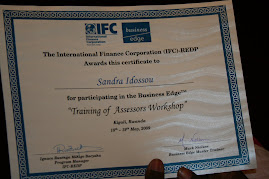
CUSTOMER CARE: Excerpts from the Customer Care handbook
by Sandra idossou
This is to respond to many readers on my last week article on the Customer Care handbook that was launched by the Private Sector Federation and sponsored by the Rwanda Development Board (RDB).
Many wanted me to give them more insights about this interesting book. In response to the many questions I received, I would like to share with you, dear readers some excerpts.
For the purpose this handbook, I spoke to some business people in Kigali to have their statements on why customer service was important to their businesses.
I was privileged to talk to Business owners, managers, government officials and even to my tomato seller at Kimironko Market.
The variety of the panel who gave their statements clearly showed that customer service is a national issue.
This indicates that customer care is not only for the private sector people. Rather, it involves every actor in the economy of the country; from public sector down to retailers and big organizations.
Out of the 12 declarations I got for the book, I will like to share with you some few ones.
Page 6: What some entrepreneurs in Rwanda say about Customer Care
“Customer Care is important for us in the health sector because it reassures and comforts our patients right from their first contact with us.
It makes them reassured and know that they can count on us,” Dr Diane Gashumba, Director of Muhima Hospital.
Mary Gahonzire, Deputy Commissioner General Rwanda National Police said, “Service Delivery ought to be done professionally.
The people we serve are our customers and we ought to treat them well. Policing, Service and Customer Care are all three inseparable.”
According to Janet Kayitessi, Tomatoes seller at Kimironko market, I have to welcome very well all my customers so that they will always buy from me.
I need to show them that I appreciate their patronage. “We are in business because of and for our customers; they are the drivers of our product and investment decisions.
Customers are the reason we are,” Andrew Rugenge COO MTN Rwanda said.
“We want our customers to feel good in our saloon because we want them to come back and talk good about our services to others.
There are many salons in town but it is the way we handle our customers that make the difference,” said Claire Nkulikiyimfura Owner Keza Saloon UTC Kigali
“Good quality customer service is when a client leaves our bank with a smile on his face and will have no reservations at all in returning to us for his next transaction or recommending the bank to others,” said Daniel Sackey MD Ecobank Rwanda

We can all agree from these statements that Customer Service is important for all but unfortunately miracles will just not happen if nothing is done.
One essential element of reaching the expected level of service delivery in Rwanda is through constant education.
First, the staff but also as consumers we don’t have to accept mediocrity or poor service anymore, especially if we pay for it.
As President Kagame often says when you go to a restaurant and the service is poor, sanction the service provider by not going there anymore.
For me as a customer and probably for all of us, the deciding factor in shopping in a particular shop is the quality of the customer service.
The coke or beer I’ll buy in a restaurant is the same in every other bar or restaurant in town.
The only difference is the service around this beer; the ambiance, the décor, the professionalism and friendliness of the staff etc…
The only difference is the service around this beer; the ambiance, the décor, the professionalism and friendliness of the staff etc…
If we do not get good service in one particular bar, let’s go elsewhere.
There are choices today. So dear customer, you have the right and today the obligation to sanction poor service delivery in Rwanda.
Concerning the staff, start today their training by offering each of one of them this new handbook on Customer Care. I can assure you that it is resourceful material that will help your people in contact with customers.
The 46 pages book is written in English and Kinyarwanda and is a must read book targeted at all service people.
Equip today your staff with the basic knowledge they need so that they will be able to offer excellent customer care to your customers.
If you want them to take good care of your customers, do take care of them by offering this handbook to all your team members. You will be the beneficiary of this kind gesture.
The author is a customer service consultant working in Rwanda











































